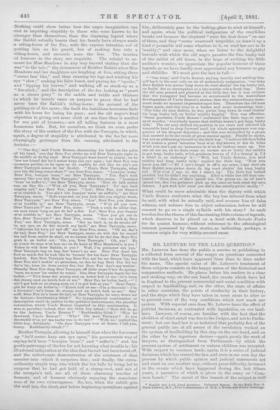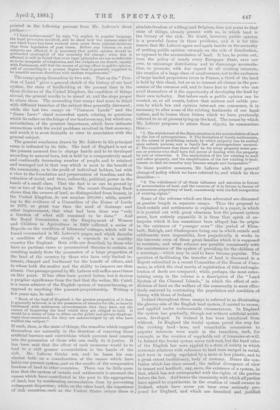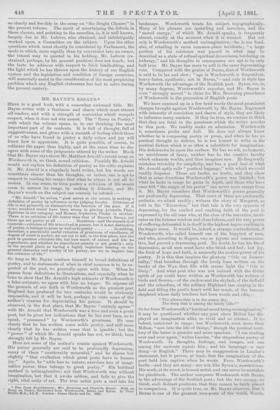MR. LEFEVRE ON THE LAND QUESTION.* LEFEVRE has done the
public a service in publishing in a collected form several of the essays on questions connected with the land, which have appeared from time to time under his name. The special value of Mr. Lefevre's treatment of these subjects consists in the happy union of the historical and comparative methods. He places before his readers in a clear and striking way, on the one baud, the events which have led in England to the present commercial and social condition with respect to landholding, and, on the other, the state of affairs in other countries, the points of similarity in their history, and the steps which they have taken in some cases to alter or to prevent some of the very conditions which now mark our system. With especial care does Mr. Lefevro trace the effect of judicial decisions, as contrasted with legislation, on our land- laws. Lawyers, of course, are familiar with the fact that the abolition of strict entail was duo to the Judges, and not to Parlia- ment; but our land-law is so technical that probably few of the general public are at all aware of the revolution worked on the system of landholding by this step on the one baud, and on the other by the ingenious devices—again purely the work of lawyers, as distinguished from Parliament—by which the present system of settlement on unborn children was invented. With respect to common lands, again, it is a series of judicial decisions which has created the law, and even in our own day the process by which public opinion and judicial statements act and react on one another may, without great difficulty, be traced in the events which have happened during the last fifteen years, a narrative of which is given in the essay on " Com- mon Lauds." The moral of this branch of the subject is well
• Enplith and Land Qitestions. Collected ERPays. By the Itight lion. G. Ellaw-Lefevro, M.P., First Commissioner of 11.61.'s Works and Public Buildings.
pointed in the following passage from Mr. Lefevre's short preface :- "I have endeavoured," ho says, "to explain in popular language the legal principles involved, and to show how the present state of our Land Laws has been evolved even more from judicial decisions than from legislation of past times. Before any reforms on such subjects are effected, it is necessary that public opinion should be persuaded thoroughly of the necessity for change ; when this is effected, it will be found that oven legal principles are not so inflexible as to be incapable of adaptation, and the Judges on the Bench, equally with Parliament, will find the means of giving effect to public opinion, and of reconciling to a greater degree than is generally supposed to be possible ancient doctrines with modern requirements."
The essays group themselves in two sets. That on the " Free- dom of Land" gives a general sketch of the history of our land system, the state of landholding at the present time in the three divisions of the United Kingdom, the condition of things abroad, the general results to be aimed at, and the steps proper to attain them. The succeeding four essays deal more in detail with different branches of the subject thus generally discussed; while the last two essays on " Common Lands " and the "Game Laws" stand somewhat apart, relating to questions which lie rather on the fringe of our land economy, but which arc, nevertheless, of the greatest importance, which have intimate connections with the social problems involved in that economy, and which it is most desirable to view in association with the general subject.
The general conclusion drawn by Mr. Lefevre in his principal essay is indicated by its title. The land of England is not at the present moment free to change hands and to be developed according to natural laws, but is held. by a comparatively small and continually decreasing number of people, and is retained and managed not in that way which is most to the benefit of the community, or to the profit of individual holders, but with a view to the foundation and perpetuation of families, and the retention of social, and thus, indirectly, political, power in the hands of a small class. That the fact is so can be proved by one or two of the simplest facts. The recent Domesday Book shows that the owners of land, as distinguished from houses, in the United Kingdom, do not number 200,000 ; while, accord- ing to the evidence of a Committee of the House of Lords in 1873, so great was then the need of drainage and other improvement, that what had been done was "only a fraction of what still remained to be done." And the Royal Commission on the Employment of Women and Children in Agriculture in 1869 collected a series of Repoilts on the condition of labourers' cottages, which will be
found summarised in Mr. Lefevre's pages, and which describe
a condition of things simply a reproach to a wealthy country like England. Both evils are described, by those who
have no partisan views or preconceived theories to sustain, as resulting mainly from the possession of a large proportion of the land of the country by those who have only limited in- terests, charged and burthened for the benefit of others, and to whom both the motive and the ability to improve are thus absent. One passage quoted by Mr. Lefevre will suffice as evidence on this point. It has often been quoted before, but it derives a pee liar significance from the fact that the writer, Mr. Caird, is a warm admirer of the English system of tenant-farming, as opposed to anything like peasant-proprietorship. Writing a few years ago, he said:— "Much of the land of England, a far greater proportion of it than is generally believed, is in the pbaseseion of tenants for life, so heavily burthened with settlement encumbrances that they have not the means of improving the land which they are obliged to bold. It would be a waste of time to dilate on the public and private disadvan- tages thus occasioned, for they are acknowledged by all who have studied the subject."
If such, then, is the state of things, the remedies which suggest themselves are naturally in the direction of removing those artificial barriers and restrictions which prevent land coming into the possession of those who can really do it justice. It has been said that the effect of such measures would be to
lead to a still greater accumulation in the hands of the rich. Mr. Lefevre thinks not, and he bases his con- clusion both on a consideration of the causes which have led to our present system, and ou the results of the comparative freedom of land in other countries. There can be little ques-
tion that the system of entails and settlements is amongst the causes which have contributed in the past to the aggregation of land, less by accelerating accumulation than by preventing subsequent dispersion ; while, on the other hand, the experience of rich countries, such as the United States (where there is absolute freedom of willing) and Belgium, does not point to that state of things, already present with us, in which land is the luxury of the rich, No doubt, however, public opinion is a powerful factor in these problems, and it is for this reason that Mr. Lofevre again and again insists on the necessity of putting public opinion strongly on the side of distribution,. as opposed to the accumulation of laud. It has, he points out, been the policy of nearly every European State, save our own, to encourage distribution and to discourage accumula- tion, to promote, with due regard to all existing interests,.
the creation of a large class of small owners, not to the exclusion of largo landed proprietors (even in France, a third of the land is held by this class), but so as to interest all classes in the pos- session of the common soil, and to leave free to those who can avail themselves of it the opportunity of developing the land by their own industry. But before such a public opinion can be- created, or, at all events, before that curious and subtle pro- cess by which law and opinion inter-act can commence, it is necessary to alter some of the existing landmarks of our legal system, and to loosen those fetters which we have previously referred to as at present tying up the land. The means by which Mr. Lefevre proposes to attain those objects, he summarises. thus :—
"1. The withdrawal of the State sanction to the accumulation of land. by the law of primogeniture. 2. The limitation of family settlements,. to the extent of prohibiting entails, by which property can be settled upon unborn persons, and a family law of primogeniture secured. 3. The requirement that there shall be for every property some per- son or persons who shall have full power of dealing with.the property by sale or otherwise. 4. The assimilation of the law relating to land and other property, and the simplification of the law relating to land- tenure, so that its transfer may become simple and inexpensive."
To these positive measures, Mr. Lcfevre adds that general change of policy which we have referred to, and which he thus describes :—
" 5. The withdrawal of all State influence and sanction in favour of accumulation of land, and the exercise of it in future in favour of a numerous proprietary of land, consistently with the full recognition of existing rights."
Some of the reforms which are thus advocated are discussed at greater length in separate essays. Thus the proposal to limit entails and settlements is explained in a paper, in which it is pointed out with great clearness how the present system arose, how entirely separable it is from that spirit of en- terprise which it has sometimes been alleged has its origin in the existence of " younger sons " (the period of Eliza- beth, Raleigh, and Shakespeare being one in which entails and.
settlements were impossible), how prejudicially it works in. the interests even of those great families which it is supposed to maintain, and what reforms are possible consistently with the maintenance of the system of providing for the children of a marriage,—which may be said to have become popular. The
question of facilitating the transfer of land is discussed in to Report submitted to a recent Committee of the House of Com- mons, in which the rival merits of registration of title and regis- tration of deeds are compared; while, perhaps, the most enter- taining essay in the volume is a description of the " Land. System.of the Channel Islands," in which the effect of sub- division of land on the welfare of the community is most effec- tively enforced by contrasting the population and condition of
Jersey with those of Ireland.
Ireland throughout these essays is referred to as illustrating the gloomy side of the English laud system, if carried to excess,.
and applied under unfavourable circumstances. In England. the system has gradually, though not without artificial assist- ance, developed. In Ireland it has been introduced from. without. In England the feudal system paved the way for the existing laud - laws, and remarkable concessions to . popular interests were made in the transition, such, for example, as the creation of copyholds out of tenancies-at-will. In Ireland. the feudal system never took root, but the hard rules of the English law were applied to a state of society iu which economic relations with reference to land were merged in social,. and were in reality regulated by a more or less plastic, and to a great extent traditionary, body of customs. Hence the con- fusion which has siuco ensued; the radical divergence of view in tenant and landlord ; nay, more, the existence of a system, in fact, which has not corresponded with the rights of the parties. before the law. And hence the unanimity with which all parties have agreed to experiments in the creation of small owners in Ireland, which have never yet been even seriously pro- , posed for England, and which are described. and justified so clearly and forcibly in the essay on "the Bright Clauses" in the present volume. The merit of ascertaining the defects in these clauses, and pointing to the remedies, is, it is well known, §largely due to Mr. Lefevro, who obtained, and indefatigably worked upon, a Committee on the subject. Upon the other questions which must shortly be considered by Parliament, the mode iu which, more rapidly than by conversion into an. owner, Vre tenant may be quieted in his holding, Mr. Lefevre (re- strained, perhaps, by his present position) does not touch ; but the facts he adduces with respect to Irish landholding, and the light which he has thrown upon the history of our English system and the legislation and condition of foreign countries, will materially assist in the consideration of the most perplexing ;problem which any English statesman has had to solve during the present century.


































 Previous page
Previous page